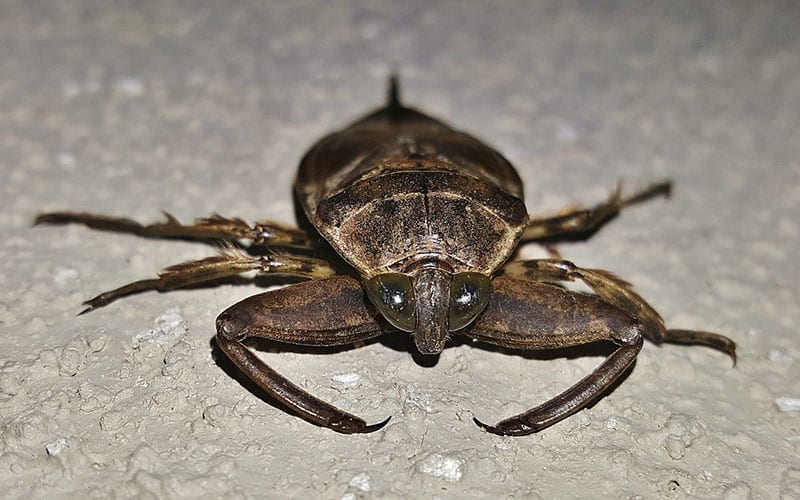Mice and cockroaches are some of the common pests homeowners struggle with, but don’t disregard the risks posed by other insects. If you have ever found small cockroach-like aquatic insects skittering around your home, you may have a water bug infestation. Water bugs can contaminate your food, cause respiratory problems, and even bite.
What is a Water Bug?
Water bugs are a group of insects that live in or around water and occasionally inside your home. There are four kinds of water bugs that you may find yourself dealing with in an infestation.
These water bugs are known as:
- True water bugs
- Giant water bugs
- Backswimmers
- Creeping water bugs
Their distinct shape can reveal the type of water bug.
Most water bugs look similar to cockroaches but can grow much bigger. The average water bug will grow to about 2 inches, but giant water bugs can grow up to 5 inches. Their ideal environments are wet or damp locations, so they will venture into a home if it meets these conditions.
Water bugs will bite when they feel threatened, though most people will only suffer a little itching and redness from them. Allergies can cause worse reactions, but these are rare. A typical bite can be dealt with by applying a cold compress or bite cream.
Signs of a Water Bug Infestation
There are several ways to identify whether or not water bugs have infested your home:
- Keep your eye out for small black pellets. These can be water bug egg casings or droppings left behind by your little invader.
- If your home is always humid, this may act as a draw for water bugs. Generally, they will only live outdoors, but if your home is humid enough, water bugs may invite themselves in.
- Check your pipes for leaks. Leaking pipes can create the ideal damp climate, just like humidity. Darker places like your basement or inside your walls may become ideal homes for invading bugs.
- If you have a pool, check its pumps and fixtures for algae. Algae is a water bug’s favorite food and will draw them into the pipes of your pool. Also, look for eggs and shell casings for further confirmation.
How to Get Rid of Water Bugs
Individually, water bugs are not difficult to get rid of, but when they begin to multiply, you will have problems. If you find multiple water bugs in your home, it’s best to contact a pest control professional as DIY methods won’t have much impact.
If, however, you find a few isolated water bugs roaming around, here’s how you can deal with them.
1. Water Bug Traps
You can place these traps in areas where water bugs are present to bait them. Once baited, the bugs will be poisoned and will die within hours. As the poison can be spread by contact, other bugs will also die if they take it back to their nest.
2. Bug Spray
This is another simple solution available in most supermarkets or hardware stores. Spray any water bugs you see for on-the-spot extermination.
3. Boric Acid
Boric acid is a natural substance that acts as a stomach poison for water bugs. Using a disposable plate with sugary food as bait can attract water bugs to their death. Simply sprinkle a circle of boric acid around the sugary bait and see water bugs pick it up as they walk through it. After that, it’s just a matter of time.
Another option is to mix some flour, confectioner’s sugar, boric acid, and water into a soft dough. Spread the dough into any cracks in your walls that the bugs get through. They will be attracted to it and consume the acid.
4. Hot Water
Pouring freshly boiled water onto water bug nests will destroy them and any eggs inside. This only helps if you know where the nest is, and you will need to pour the water at least twice a day. The hot water will crack any eggs, and too much heat will kill adults.
5. Alcohol
Soaking bait in alcohol. The alcohol will damage the water bugs and their eggs, preventing them from multiplying.
Ways to Prevent Further Water Bug Infestations
The easiest way to deal with a water bug infestation is to prevent one from occurring at all. Since water bugs are outdoor creatures, they only tend to come indoors if you provide them with a reason to be there. Here are a few things you can do around your house to prevent them from taking up residence:
-
Improve Ventilation
By preventing your home from becoming too warm and humid, you will keep water bugs at bay. Keep your house well ventilated, and they will find no reason to enter.
-
Prevent and Remove Standing Water
As their name implies, water bugs are attracted to water. If your home has consistently damp areas, water bugs will find their way in. If you keep all areas dry and stop any leaks, they won’t come in.
-
Seal any Points of Entry
If they can’t get in, they can’t infest. Check your home for all cracks or vents that will allow water bugs to enter. Fill cracks and apply bug nets or sheets to vents to prevent entry. Steel wool or cement can also help block any inviting gaps.
As they say, the best offense is a good defense. With due diligence, you can catch a water bug infestation before it becomes a problem for your home. If the infestation occurred due to flooding, we’re here to offer our flood restoration services in Bountiful, Layton, or other areas of Davis County to address the root cause of the spread.

